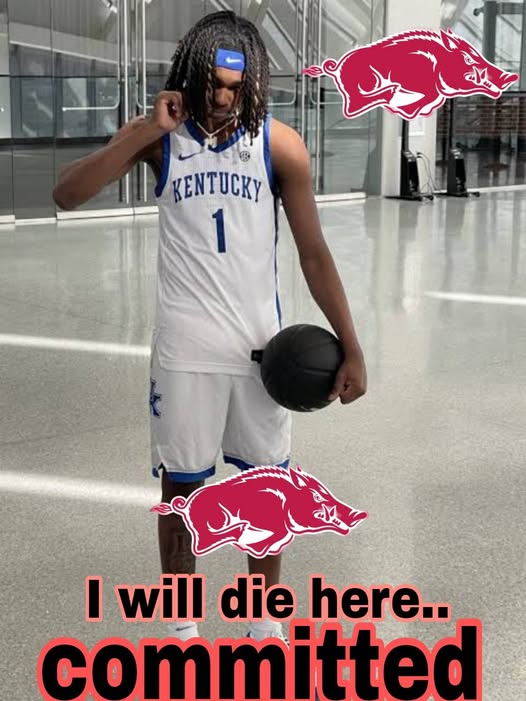In a move that has sent shockwaves through the college basketball community, Jasper Johnson, the highly touted five-star guard from Lexington, Kentucky, has announced his decision to decommit from the University of Kentucky and instead commit to the Arkansas Razorbacks. This unexpected turn of events has left fans and analysts alike scrambling to understand the motivations behind Johnson’s change of heart and its implications for both programs.
Johnson’s initial commitment to Kentucky was seen as a significant victory for the Wildcats. As a Lexington native and the son of former Kentucky football standout Dennis Johnson, Jasper’s decision to stay home and play for the Wildcats was celebrated by the Big Blue Nation. His commitment was not only a testament to his belief in Coach Mark Pope’s vision but also a nod to his family’s deep-rooted ties to the university. At the time of his commitment, Johnson expressed his enthusiasm, stating, “Being from Lexington and playing for the home school, my city and state meant something to me.”
However, the landscape of college basketball recruiting is ever-evolving, and Johnson’s recent decision underscores the complexities that top prospects navigate. While specific details surrounding his decommitment from Kentucky remain scarce, several factors may have influenced his choice.
Firstly, the allure of Arkansas’s basketball program under the leadership of Coach John Calipari cannot be understated. Calipari, known for his ability to develop NBA-ready talent, has transformed the Razorbacks into a formidable force in the Southeastern Conference (SEC). His track record of guiding players to professional success is undoubtedly appealing to recruits with aspirations of reaching the NBA.
Additionally, the Razorbacks have been making significant strides in recruiting, recently securing commitments from other top-tier prospects. Notably, they landed Darius Acuff Jr., a five-star point guard ranked higher than Johnson in the 2025 class. The prospect of teaming up with other elite players in a competitive environment may have played a role in Johnson’s decision.
Another potential factor is the evolving nature of Name, Image, and Likeness (NIL) opportunities. With the NCAA’s recent changes allowing athletes to profit from their NIL, different programs offer varying levels of exposure and commercial prospects. It’s plausible that Johnson and his advisors evaluated the potential NIL opportunities at Arkansas and found them more favorable.
For Kentucky, Johnson’s decommitment is undoubtedly a setback. The Wildcats had been building momentum with their 2025 recruiting class, securing commitments from other talented players such as Malachi Moreno and Acaden Lewis. Losing a player of Johnson’s caliber necessitates a recalibration of their recruiting strategy. Coach Pope and his staff will need to redouble their efforts to fill the void left by Johnson’s departure and reassure fans and stakeholders of the program’s direction.
On the other hand, Arkansas’s gain is monumental. Adding Johnson to their roster not only bolsters their backcourt but also sends a strong message to future recruits about the program’s upward trajectory. The Razorbacks are positioning themselves as a premier destination for top talent, and Johnson’s commitment further solidifies that reputation.
This development also highlights the fluid nature of college basketball recruiting. Commitments, while celebrated, are not set in stone. Various factors, including coaching changes, program performance, personal considerations, and external opportunities, can influence a player’s decision up until the moment they sign their National Letter of Intent.
For Johnson, the decision to switch commitments was undoubtedly challenging. Growing up in Lexington, the dream of playing for the Wildcats is one that many young athletes share. However, personal growth, career aspirations, and the pursuit of the best fit can lead to unexpected choices. It’s essential to recognize and respect the agency of young athletes as they navigate these pivotal decisions.
As the college basketball world absorbs this news, attention will inevitably turn to how both programs respond. Kentucky will need to identify and pursue other prospects to maintain the competitiveness of their recruiting class. Arkansas, meanwhile, will look to integrate Johnson into their future plans and capitalize on the momentum his commitment brings.
Fans from both camps have expressed a mix of emotions. Kentucky supporters are understandably disappointed, having envisioned Johnson as a cornerstone of their future success. Conversely, Razorbacks fans are elated, viewing this commitment as a testament to the program’s growing allure and competitiveness.
In the broader context, Johnson’s decision underscores the dynamic and often unpredictable nature of college basketball recruiting. It serves as a reminder that, beyond the statistics and rankings, these decisions are deeply personal and influenced by a myriad of factors. As stakeholders in the sport, it’s crucial to support young athletes as they make choices that align with their goals and well-being.
Looking ahead, all eyes will be on Johnson as he embarks on this new chapter with the Arkansas Razorbacks. His development, performance, and the impact he will have on the program will be closely watched. Similarly, Kentucky’s response to this decommitment will be a topic of interest, as they seek to reinforce their standing as a premier destination for top talent.
, Jasper Johnson’s decision to decommit from Kentucky in favor of Arkansas is a significant moment in college basketball recruiting. It reflects the multifaceted considerations that top prospects must weigh and highlights the ever-changing landscape of the sport. As fans and analysts, it’s a development that invites reflection on the complexities of recruitment and the journeys of young athletes striving to make their mark.



